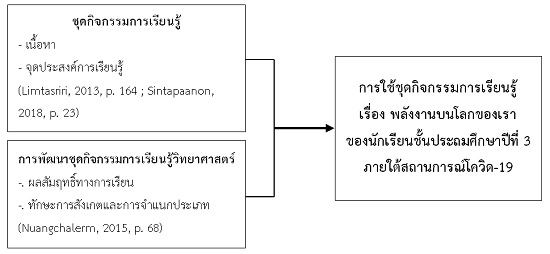THE EFFECTS OF USING LEARNING ACTIVITIES PACKAGE ON ENERGY ON OUR EARTH TO ENHANCE LEARNING ACHIEVEMENT OBSERVATION SKILLS AND CLASSIFICATION SKILLS OF 3rd GRADE STUDENTS UNDER THE COVID-19 SITUATION
DOI:
https://doi.org/10.14456/nrru-rdi.2023.2Keywords:
Learning activity package, Learning achievement, Observation skills, Classification skillsAbstract
The purpose of this research was to create and find the efficiency of the learning activity package on energy on our planet to attain the efficiency of 80/80, and compare the learning achievement, observation skills, and classification skills of students before and after learning by using the learning activity package. The target groups selected for purposive sampling were thirteen 3rd-grade students. The research instruments included 1) the learning activity package on energy on our planet, 2) the learning achievement test which has a discrimination between 0.20-0.50, and 3) the observation skills and classification skills test which has a discrimination between 0.39-0.75. Data were collected according to the learning and pretest-posttest. The statistic used in the research were percentage, mean, standard deviation, and dependent samples t-test. The research findings were as follows; 1) The learning activity package's energy efficiency on our planet is 93.08/83.08, which is greater than the minimum need, 2) Students' mean learning achievement score was considerably greater after using the learning activity package than it was before learning at a.05 level of significance., and 3) After learning by using the learning activity package, students’ mean score of observation skills and classification skills was higher than before learning significantly at a .05 level of significance. The results of the research indicated that there is learning management using the learning activity package in learning unit of science subject during the COVID-19 situation.
References
Banbukekhla (Bunchop Sakhrin) School. (2021). 3 rd Students Information of the academic year 2020 from Banbukekhla (Bunchop Sakhrin) School. Retrieved January 26, 2023, from https://data.boppobec.info/web/index_view_stu.php?School_ID=1095440020&Edu_year=2564&p=y (In Thai)
Bergman, J. (1996).Understanding educational measurement and evaluation. Bostan : Hougtan Mifflin.
Brahmawong, C. (2013). Developmental Testing of Media and Instructional Package. Silpakorn Educational Research Journal, 5(1), 7-20. (In Thai)
Buosonte, R. (2020). Research and development of educational innovations (2nd ed.). Bangkok : Chulalongkorn University. (In Thai)
Chamnian, M. (2021). Learning to promote health of youth in the situation of the COVID-19 epidemic. Academic Journal North Bangkok University, 10(2), 1-9. (In Thai)
Cohen, L. Manion, L., & Morrison, K. (2000). Research methods in education. (5th ed.). London : Routledge Falmer.
Kasemsukwimon, C. (2021). The Development of Science Learning Activity Sets Interesting Plants, for Grade 4 Students of Chumchonbansaiyoi School Phitsanulok Province. Journal of legal entity management and local innovation, 7(12), 195-208. (In Thai)
Laohapaiboon, P. (1999). Science teaching (3rd ed.). Bangkok : Thai Watanapanich. (In Thai)
Limtasriri, O. (2013). Innovation and technology for learning management. Bangkok : Ramkhamhaeng University. (In Thai)
Ministry of Education. (2009). Basic Education Core Curriculum B.E. 2551. Bangkok : Agricultural Cooperative Federation of Thailand. (In Thai)
Ministry of Education. (2017). Indicators and Learning areas Science area in Basic Education Core Curriculum B.E. 2551 (revised edition 2017). Bangkok : Agricultural Cooperative Federation of Thailand. (In Thai)
Moonkam, S., & Suntonprasert, S. (2012). The Develop works to upgrading academic standing. Bangkok : E.K. books. (In Thai)
Nuangchalerm, P. (2015). Science learning in the 21st century. Bangkok : Chulalongkorn. (In Thai)
Office of the Basic Education Commission. (2021). Guidelines document for Teaching and Learning in the Situation of the Coronavirus Disease 2019 (COVID-19) for Teachers and Parents. Bangkok : Special center distance education in Coronavirus Disease 2019 situation (COVID-19). (In Thai)
Pankham, U., Chaowakeeratipong, N., & Suwanjinda, D. (2020). The effects of using basic science process skills activity training packages on science process skills learning, learning achievement and scientific attitudes of Pratom Suksa IV-VI students of primary schools in sub-district of Chiang Mai. Journal of Education Burapha University, 31(2), 123-136. (In Thai)
Phettaweeporndech, K. (2007). The best way to teach science leads to………. Learning management for new teachers. Bangkok : Aksorncharoentat. (In Thai)
Prasertsin, U. (2020). Research instruments in education and social sciences. Bangkok : Chulalongkorn University. (In Thai)
Saaiyot, L., & Saaiyot, A. (2010). Education research techniques. Bangkok : Suweeriyasan. (In Thai)
Sintapaanon, S. (2018). Instructional Innovation to Promote students’ skills in the 21st Century. Bangkok : Chulalongkorn University. (In Thai)
Sukhothai Thammathirat Open University. (2011). Teaching document subject set learning material elementary level unit 8-15. Nonthaburi : Sukhothai Thammathirat Open University. (In Thai)
Sutthirat, C. (2016). 80 Innovative learning management that emphasizes student focus (7th ed.). Bangkok : Chulalongkorn University. (In Thai)
Thamrongsotthisakul, W. (2017). The reflection on the concepts of instructional package, Learning activity package and learning package. Journal of Education Naresuan University, 19(3), 356-369. (In Thai)
The National Institute of Educational Testing Service. (2019). Basic statistics, O-NET test results, grade 6, the academic year 2018-2020. Retrieved January 5, 2020, from https://www.niets.or.th/th/catalog/view/3865 (In Thai)
Tirakanan, S. (2007). Construction of Measuring Instruments in Social Science Research: A Guide to Practice. Bangkok : Chulalongkorn University Press. (In Thai)
Wanpan, W. & Ruangsat, W. (2021). The Development of Scientific Process Skills with the Observational Skill Packages on Classification and Experiment for Grade 6 Students in Satit Elementary School, Phranakhon Si Ayutthaya Rajabhat University. ARU Research Journal, 8(3), 43-52. (In Thai)
Wattanasiri, T., Tongsorn, P., & Singlop, S. (2018). Effects of Scientific learning package using STEM Education in grade 7 students. Journal of Education Naresuan University, 20(3), 49-63. (In Thai)

Downloads
Published
How to Cite
Issue
Section
License

This work is licensed under a Creative Commons Attribution-NonCommercial-NoDerivatives 4.0 International License.




